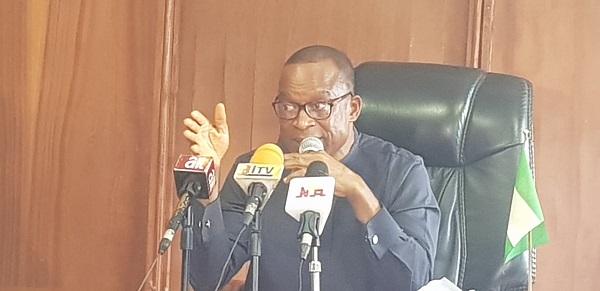
As Nigeria enters the peak of the rainy season, the director-general of the Nigeria Hydrological Services Agency (NIHSA), Engr. Clement Nze, has lamented that state governments are not proactive in their actions to curtail flooding incidences in the nation.
Addressing a press conference on the overview of 2021 Annual Flood Outlook (AFO): Update of flood situations in the country, said rather than take proactive measures to mitigate flooding in their states, governors only adopted the ‘fire brigade’ approach when flooding incidence occurred in their respective states.
It would be recalled that the Minister of Water Resources, Engr. Suleiman Adamu, presented the 2021 AFO to the general public earlier in May this year, highlighting that no less than 121 local government areas in 27 states and the FCT fall within the highly probable flood risk states of Abia, Akwa-Ibom, Anambra, Bauchi, Bayelsa, Benue, Cross-River, Delta, Ebonyi, Edo, Gombe, Imo, Jigawa, Kaduna, Kano, Kebbi, Kogi, Kwara, Lagos, Nasarawa, Niger, Ogun, Oyo, Rivers, Sokoto, Taraba, and Zamfara respectively. The prediction equally indicated that at least another 302 local government areas cutting across the entire country fall within the moderately probable flood risk states.
Nze said details of the LGAs were made available to the general public, and each state governor was duly informed in writing of the LGAs in their respective states that could be flooded in 2021, lamenting that nothing much had been done to forestall the occurrence.
“The purpose of this press briefing is to call the attention of the general public especially the states and local government councils to intensify and step-up efforts towards averting flood-related disasters in their domains as the nation gradually gets into the peak of the flooding season. The peak of flooding is usually during the months of July-August-September and early October.
“Meanwhile several states have already experienced high degree of flooding incidents with the attendant destructions accompanying them. As early as April this year, some states had started experiencing flooding. As at today, flood disasters have occurred in many states, notable among these are Lagos (Mushin, Shomolu, Victoria Island, Lekki, Marina, etc), Nasarawa (Keffi), Anambra (Onitsha), Imo (Owerri), Abia (Aba), Kwara (Ilorin, Offa), Kaduna (Kaduna), Rivers (Bori), Enugu ((Enugu), Ogun (Ijebu Ode), Delta (Asaba), Taraba (Jalingo), Yobe (Gashua), Ekiti (Ado Ekiti), Borno, Ondo (Akure town), Katsina, Maiduguri. This is quite early in the day. It must be pointed out that virtually all the flood incidents above were caused by poor drainage systems as localized rainfall generated the flash/urban flooding. River flooding and coastal flooding are yet to set in,” he said.
Giving recommendations, the NIHSA boss urged states and the general public to clear blocked drainage systems and canals, remove refuse, weeds, water hyacinths and floats on water channels; relocate to higher grounds for people living along the waterways and those carrying out socio-economic activities on flood plains; improve system for flood monitoring, flood forecasting and early warning.
Other recommendations he gave included effective and efficient operational procedure for dams and reservoirs and maintenance of other hydraulic and water infrastructure across the country; construction of dykes, flood-walls, buffer dams, detention basins and water retaining structures amongst other measures.


